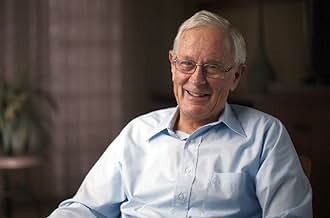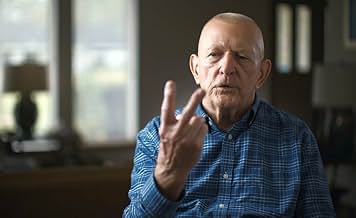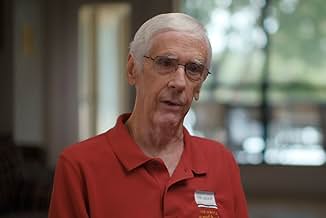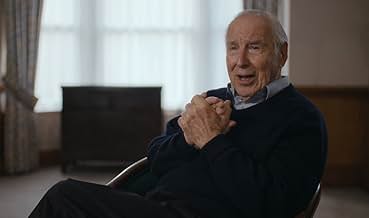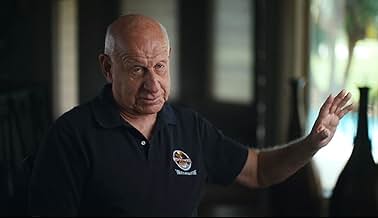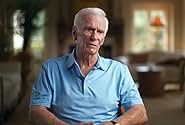IMDb-BEWERTUNG
7,5/10
1723
IHRE BEWERTUNG
Das Herzstück des Apollo-Programms war das Spezialteam in der Mission Control, das einen Mann auf den Mond brachte und half, die Zukunft zu gestalten.Das Herzstück des Apollo-Programms war das Spezialteam in der Mission Control, das einen Mann auf den Mond brachte und half, die Zukunft zu gestalten.Das Herzstück des Apollo-Programms war das Spezialteam in der Mission Control, das einen Mann auf den Mond brachte und half, die Zukunft zu gestalten.
- Auszeichnungen
- 1 Nominierung insgesamt
Stephen Bales
- Self
- (as Steve Bales)
James Burke
- Self
- (Archivfilmmaterial)
Eugene Cernan
- Self
- (as Gene Cernan)
Charles Duke
- Self
- (as Charlie Duke)
Christopher Kraft
- Self
- (as Chris Kraft)
Empfohlene Bewertungen
Good solid documentary on how Mission Control developed during the space program with a particular focus on the men themselves (and, in the beginning, there were only men).
Highlighted are the missions of Apollo 8, 11 & 13 and the problems and challenges they faced. A good number of the mission specialists are interviewed with Gene Kranz being the big papa bear.
During the course of the interviews, two comments really stand out: The first when one of the men admits that working at Mission Control was so life consuming that he confesses he wouldn't have done it were he knew then what he knows now as far as what it did to his family life. The other is in the moments of real crisis during Apollo 13 where the pressure gave him thoughts of bailing out and leaving the mission behind. Bravo for their honesty.
On a technical end, the special effects are to be applauded. They never look too modern, nor too CGI. While they are certainly far more advanced that the graphics of the 60s and the 70s, they still have a natural, organic feel.
A job well done.
Highlighted are the missions of Apollo 8, 11 & 13 and the problems and challenges they faced. A good number of the mission specialists are interviewed with Gene Kranz being the big papa bear.
During the course of the interviews, two comments really stand out: The first when one of the men admits that working at Mission Control was so life consuming that he confesses he wouldn't have done it were he knew then what he knows now as far as what it did to his family life. The other is in the moments of real crisis during Apollo 13 where the pressure gave him thoughts of bailing out and leaving the mission behind. Bravo for their honesty.
On a technical end, the special effects are to be applauded. They never look too modern, nor too CGI. While they are certainly far more advanced that the graphics of the 60s and the 70s, they still have a natural, organic feel.
A job well done.
This is an actual good documentary which in my opinion is underated.
Interviews with numerous engineers that worked on the apollo program as wel as archival footage mixed with VFX really give a good representation of what the missions were like and how special of an achievement the apollo missions were.
When a documentary is able not only to inform accurately but also to engage emotionally its audience, well that's a hell of an accomplishments...
Mission Control does that as only a few other documentaries do; without slipping into nostalgia for the sake of it or cheesy celebration of the good old times, Mission Control brings us back in the heart of the action of the critical Apollo missions, from the desks of the Houston centre. Its ability to highlight the human side of such actions alongside the technological one is stunning.
What particularly amazed me is how much these guys could accomplish with a technology that, compared to what we have now, it stone age...
If you've studied your history, watched the Discovery Channel and seen movies like 1983's "The Right Stuff", 1995's "Apollo 13" or even "Space Camp" (1986), "Armageddon" (1998) or "Gravity" (2013), you may think you know about the U.S. space program. Those films are all excellent (as are many other similar movies), but they only tell part of the story. If you haven't seen a well-made documentary on the subject
you don't know NASA. 2017's "Mission Control: The Unsung Heroes of Apollo" (NR, 1:41) fills in some of the gaps in our knowledge and increases our appreciation for the accomplishments of the National Aeronautics and Space Administration (especially regarding the missions to the moon) and the men who got us there. What the terrific 2016 Best Picture Oscar nominee "Hidden Figures" did for black female NASA employees, this doc does for the pasty guys with crew cuts whom those ladies supported.
"Mission Control: The Unsung Heroes of Apollo" starts by establishing its story's historical context. In 1957, the Soviet Union shocked the world by putting Sputnik, the first man-made satellite in human history, into orbit around the earth. The following year, President Eisenhower created NASA and both he and his successors, Presidents Kennedy and Johnson, refocused our attention on the space race, but it took about a decade for the U.S. to pass the U.S.S.R. Besides launching the earth's first artificial satellite, the Russians also put a man into space and then into orbit before their American Cold War rivals accomplished those feats. But by 1962, the U.S. had caught up with the Soviets and, encouraged by JFK's famous 1961 message to Congress, had set its sights on getting to the moon before the 60s had ended.
After the Project Mercury missions got American astronauts into space and Project Gemini increased the complexity and capabilities of American spacecraft, Project Apollo was created to fulfill President Kennedy's stated goal of "landing a man on the moon and returning him safely to the earth". Only, it wouldn't be a "him"; it would be "them", several groups of "them", groups of three men who would risk their lives to get to the moon. And it would only happen after much blood, sweat and tears. NASA was creating a space program from scratch and inventing the necessary processes and procedures as they went along. But they still had doubts as to whether they could even achieve the President's objective.
The dangers inherent in a robust space program (and just how much work Apollo had to do) became painfully clear in 1967 when the three astronauts of Apollo 1 were killed in a cabin fire during a prelaunch test. After taking 20 months to re-evaluate every aspect of the Apollo program, progress resumed. As this documentary works its way through the Apollo missions, it pays special and increasing attention to those which made the most history, especially Apollo 8, Apollo 11 and Apollo 13. The Apollo story is told through a combination of interviews with several surviving members of NASA mission control during the Apollo years, a significant amount of archival footage and some modern animation.
"Mission Control: The Unsung Heroes of Apollo" is a fascinating, well-balanced and entertaining documentary. It's always fun to learn something new and learning about the Apollo story through this film is about as much fun as such a thing gets. The interviews personalize the Apollo mission control experience and director David Fairhead and his team keep the clips short and the editing crisp. It's surprising how much archival footage exists to illustrate the history the film tells us and it's all well-placed throughout the movie. All this is supplemented by terrific computer animation which shows us some of the most important moments in Project Apollo like they've never before appeared in a single feature film. This documentary is so good, I was wishing it were longer than it is. "A-"
"Mission Control: The Unsung Heroes of Apollo" starts by establishing its story's historical context. In 1957, the Soviet Union shocked the world by putting Sputnik, the first man-made satellite in human history, into orbit around the earth. The following year, President Eisenhower created NASA and both he and his successors, Presidents Kennedy and Johnson, refocused our attention on the space race, but it took about a decade for the U.S. to pass the U.S.S.R. Besides launching the earth's first artificial satellite, the Russians also put a man into space and then into orbit before their American Cold War rivals accomplished those feats. But by 1962, the U.S. had caught up with the Soviets and, encouraged by JFK's famous 1961 message to Congress, had set its sights on getting to the moon before the 60s had ended.
After the Project Mercury missions got American astronauts into space and Project Gemini increased the complexity and capabilities of American spacecraft, Project Apollo was created to fulfill President Kennedy's stated goal of "landing a man on the moon and returning him safely to the earth". Only, it wouldn't be a "him"; it would be "them", several groups of "them", groups of three men who would risk their lives to get to the moon. And it would only happen after much blood, sweat and tears. NASA was creating a space program from scratch and inventing the necessary processes and procedures as they went along. But they still had doubts as to whether they could even achieve the President's objective.
The dangers inherent in a robust space program (and just how much work Apollo had to do) became painfully clear in 1967 when the three astronauts of Apollo 1 were killed in a cabin fire during a prelaunch test. After taking 20 months to re-evaluate every aspect of the Apollo program, progress resumed. As this documentary works its way through the Apollo missions, it pays special and increasing attention to those which made the most history, especially Apollo 8, Apollo 11 and Apollo 13. The Apollo story is told through a combination of interviews with several surviving members of NASA mission control during the Apollo years, a significant amount of archival footage and some modern animation.
"Mission Control: The Unsung Heroes of Apollo" is a fascinating, well-balanced and entertaining documentary. It's always fun to learn something new and learning about the Apollo story through this film is about as much fun as such a thing gets. The interviews personalize the Apollo mission control experience and director David Fairhead and his team keep the clips short and the editing crisp. It's surprising how much archival footage exists to illustrate the history the film tells us and it's all well-placed throughout the movie. All this is supplemented by terrific computer animation which shows us some of the most important moments in Project Apollo like they've never before appeared in a single feature film. This documentary is so good, I was wishing it were longer than it is. "A-"
This documentary, directed by David Fairhead, offers the viewer a most candid behind the scenes look at Houston's Mission Control Center during the early U.S. space program. If focuses primarily on the Apollo Program, of the 1960's and 70's, with plenty of archival footage of the times and interviews with those that manned the control room, as well as the astronauts that flew the early missions.
The film includes the tragedy of Apollo 1 when 3 astronauts died in a capsule fire as they awaited liftoff at Cape Kennedy, the first manned orbit around the moon on Apollo 8, and, of course, the remarkable team effort to return Apollo 13 safely back to earth after a life threatening malfunction (you may have seen the movie).
Naturally, I'm not forgetting Apollo 11, where Neil Armstrong became the first man to set foot on the moon, setting off shock waves and awe around the world. It was fascinating for me, even though I have seen other movies on this subject over the years, to hear the intricate details of what went into each flight from the engineers, flight controllers, and astronauts that lived through every minute of it.
The film includes the tragedy of Apollo 1 when 3 astronauts died in a capsule fire as they awaited liftoff at Cape Kennedy, the first manned orbit around the moon on Apollo 8, and, of course, the remarkable team effort to return Apollo 13 safely back to earth after a life threatening malfunction (you may have seen the movie).
Naturally, I'm not forgetting Apollo 11, where Neil Armstrong became the first man to set foot on the moon, setting off shock waves and awe around the world. It was fascinating for me, even though I have seen other movies on this subject over the years, to hear the intricate details of what went into each flight from the engineers, flight controllers, and astronauts that lived through every minute of it.
Wusstest du schon
- WissenswertesAt about 1:30, footage of the LM ascent module is shown lifting off from the moon. This was the final Apollo mission, Apollo 17, which left the moon on December 14, 1972. This is a remarkable shot, as the camera was being controlled remotely from Houston, and powered by the lunar rover and with the transmission being beamed from the rover's antenna. As it takes approximately one and a half seconds for a radio signal to travel from the earth to the moon and another second and a half for the return signal, controller Ed Fendell had to start the camera moving a second and a half before the actual blast off. He then used the joystick to tilt the camera upwards at the same rate as the ascent of the spacecraft, but anticipate its location from moment to moment and do it one and a half seconds early. Thanks to his precise timing, he was able to capture the shot while keeping the spacecraft in the frame the entire time.
- Zitate
Christopher Kraft: We gotta tell 'em it's got to have a computer. What the hell is a computer? It was almost that much that we didn't know.
Top-Auswahl
Melde dich zum Bewerten an und greife auf die Watchlist für personalisierte Empfehlungen zu.
Details
- Erscheinungsdatum
- Herkunftsländer
- Offizieller Standort
- Sprache
- Auch bekannt als
- NASA:s okända hjältar
- Produktionsfirma
- Weitere beteiligte Unternehmen bei IMDbPro anzeigen
Box Office
- Bruttoertrag in den USA und Kanada
- 16.405 $
- Weltweiter Bruttoertrag
- 16.405 $
- Laufzeit1 Stunde 41 Minuten
- Farbe
- Seitenverhältnis
- 1.85 : 1
- 16:9 HD
- 4:3
Zu dieser Seite beitragen
Bearbeitung vorschlagen oder fehlenden Inhalt hinzufügen

Oberste Lücke
By what name was Mission Control: The Unsung Heroes of Apollo (2017) officially released in Canada in English?
Antwort



